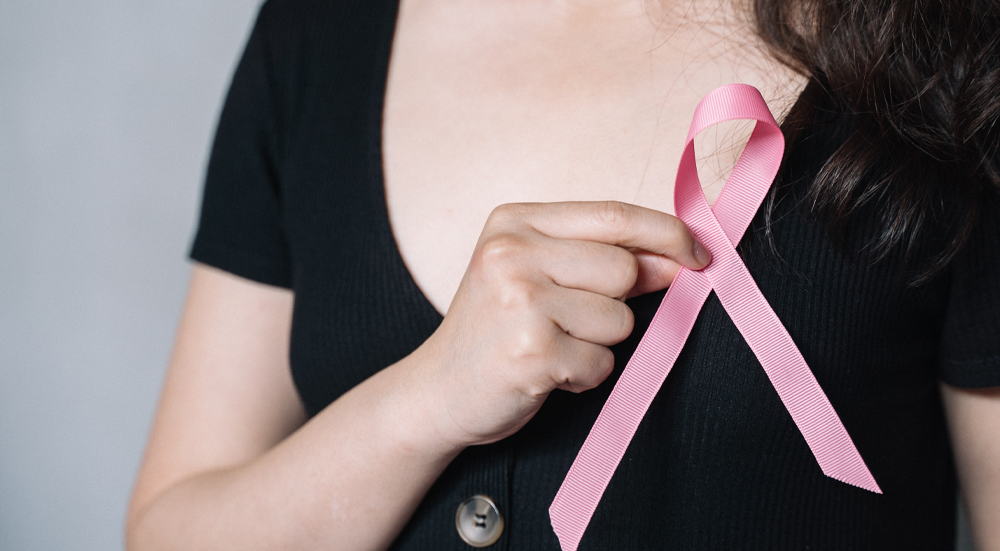You Have Given Julie Hope!
In late 2015, Julie Wilson knew something was wrong. She lost her grandmother to breast cancer and was always aware that she was at higher risk of developing the disease. As a precaution, she began having mammograms at age 40. However, in 2015, she developed pain in her right armpit that would wax and wane. Julie brought this up to her OBGYN and was immediately dismissed. In January of 2016, her worst fears were confirmed. Julie had stage 4 breast cancer.
Julie and her husband.
“It was completely overwhelming and really scary,” Julie said. “My PET scan showed that it had metastasized. I went through the staging really quickly which was terrifying. I was failing every test and that was a big deal. With the PET scan, I remember being in the room with the doctor, my two sisters, and my husband and the doctor pulled out the scan and everything was lit up like a Christmas tree. It was like, there was the evidence. It is everywhere. It is all over my body. At this point, my whole team crumbled. They were falling apart. I had to rally at this point. I remember standing up and looking at my sisters and my husband and saying, ‘come on you guys, you can’t give up on me right now. This is hard, but you can’t give up on me.’”
As with all cancer diagnoses, time is incredibly precious. Julie’s doctor laid out her options right away—estrogen blocker, aggressive chemo, or enrolling in a clinical trial. At that time, Julie felt like her best option was aggressive chemo.
Julie started on two rounds of Dose-Dense Adjuvant Doxorubicin and Taxol and then switched to Ibrance plus Letrozole. The first line of treatment was incredibly rough on Julie and the switch to Ibrance made it possible for her to return to teaching English, a job that she loves. Returning to teaching allowed Julie to share her journey with her students. While it was difficult, she felt it was important to show her students what living with cancer was really like.
“It couldn’t get any worse than what I had but I was still standing. I was back at work and for all intents and purpose living normally,” Julie said.
After her first two oncologists left or retired, Julie sought out care with Dr. Sibel Blau at Northwest Medical Specialties and has been in her care since early 2020. In the spring of 2022, for the first time, Julie’s newest line of treatment immediately failed. The path for cancer treatment includes exhausting standard of care options before looking for something “outside the box.”
“You’re under a treatment until it no longer works since cancer doesn’t die and it doesn’t want to die. I’ve had to do different things since the Ibrance,” Julie said. “The infusion drugs are really, really hard on me. When I take a pill, while there are side effects, they typically aren’t as hard on me. What I like about Dr. Blau is that she is like a chess player. She’s playing the game multiple steps down the road for me. She is trying to keep as many treatment options open for me as possible.”
For the most part, clinical trials have been unavailable to Julie because her treatment history serves as an exclusion on many protocols. Because of Julie’s molecular testing and Dr. Blau’s relationship with the South Sound CARE Foundation, the team started looking for a targeted therapy for Julie based on the molecular report. The South Sound CARE team along with Dr. Blau created a treatment plan and submitted it to the FDA and the Institutional Review Board (IRB). The medication was started in a matter of days.
Julie immediately felt like Jodi Thiel, CARE’s Research Coordinator, was a trusted member of her team. Jodi follows up with Julie frequently to ensure she has the support and care she needs.
“When I first heard about clinical trials when I was initially diagnosed, they made me feel like I didn’t matter. Like I was just a lab rat and my life didn’t matter,” said Julie. “But that was only because I didn’t understand clinical trials. Since then, I’ve become more comfortable with the process. It is so hard because no one can tell me for sure if something will work.”
Compassionate Use trials access drugs that are proven to be safe and effective in specific tumor traits but are not available through other sources. “If I had to have cancer, I am glad that it’s now. Even 10 years ago, my story would be vastly different. The drugs that they are coming out with now are absolutely amazing. The single patient clinical trials that they are giving people access to make such a difference. Access to clinical trials, like the trials that CARE provides are life-changing for so many people. The drug that I am on now is amazing,” Julie said.
While this treatment is new, Julie is doing so well and her side effects are minimal. After one month of treatment, her tumor marker had already dropped by 14 points! A lifelong teacher, Julie recently transitioned into a new role as an Instructional Coach at Chief Leschi. In this role, she helps teachers learn and grow through professional developmental.
It’s because of supporters like you that The South CARE Foundation is able to provide clinical trials to people fighting cancer in the South Sound. Thank you for giving hope to people like Julie!


